California education background checks are comprehensive screening processes required for all K-12 employees, including fingerprint-based criminal history checks through the Department of Justice and FBI. These screenings protect students by ensuring school personnel meet strict safety standards mandated by Education Code Section 45125.
Key Takeaways
- California requires all K-12 employees to undergo comprehensive background screenings including DOJ and FBI fingerprint checks before employment
- The screening process typically takes 2-4 weeks and costs between $75-$100, with employers generally covering these expenses
- Certain criminal convictions automatically disqualify candidates from education positions, while others require individual case review
- Substitute teachers, volunteers working unsupervised with children, and all certificated staff must complete the same rigorous screening process
- Background check results remain valid for multiple positions within the same district but require renewal when changing employers
- Schools must maintain strict confidentiality protocols and comply with Fair Credit Reporting Act requirements throughout the screening process
Understanding California's Education Background Check Requirements
California maintains some of the nation's strictest screening standards for educational personnel. The state requires comprehensive California education background checks for virtually all school employees who interact with students. These requirements stem from Education Code Section 45125 and other state regulations designed to protect minors.
The screening process has multiple layers of investigation. Criminal history checks through state and federal databases form the foundation. The process includes verification of educational credentials, employment history, and professional references. Districts must also search the National Sex Offender Registry and other relevant databases.
Legal Framework and Compliance Standards
The legal foundation for education screenings rests on multiple state and federal statutes. California Education Code Section 45125 mandates fingerprint-based background checks for all school employees. Federal requirements under the Every Student Succeeds Act add additional layers of compliance for districts receiving federal funding.
Districts must navigate complex legal requirements while maintaining compliance with employment law. The Fair Credit Reporting Act governs how background check information can be used in hiring decisions. Schools must provide proper notices to candidates and follow specific procedures when adverse employment actions result from background check findings.
State vs. Federal Requirements
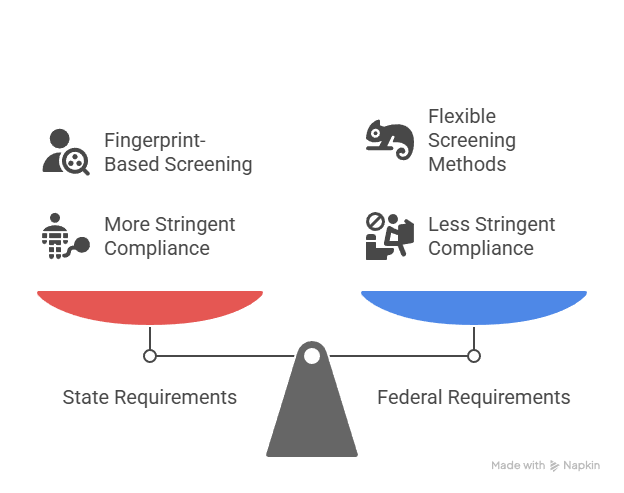
State requirements often exceed federal minimum standards for education background checks. California mandates fingerprint-based screening for all school personnel. Federal law requires background checks but allows more flexibility in screening methods. This creates a comprehensive system that provides maximum protection for students.
The interaction between state and federal requirements can create complexity for school districts. Districts must comply with both sets of regulations. They often adopt the more stringent requirements to ensure full compliance. This approach helps protect districts from legal liability while prioritizing student safety.
Types of Background Checks Required for School Personnel

California education systems employ multiple screening methods to ensure comprehensive evaluation of potential employees. The state requires different levels of screening based on job responsibilities and student contact levels. Understanding these variations helps employers implement appropriate screening protocols. It also ensures compliance with state mandates.
Fingerprint-based criminal history checks represent the cornerstone of California's education screening system. All employees must submit fingerprints for processing through the California Department of Justice and Federal Bureau of Investigation databases. This dual-system approach provides both state and national criminal history information. It ensures comprehensive coverage of an applicant's background.
| Screening Type | Required For |
| DOJ/FBI Fingerprint Check | All employees and volunteers with unsupervised student access |
| Tuberculosis Testing | All school personnel in most districts |
| National Sex Offender Search | Mandatory for all education positions |
Additional screening components vary by position and district policy. Many schools conduct comprehensive employment verification extending back seven to ten years. Professional reference checks provide insight into work performance and character assessment. These checks come from previous supervisors or colleagues in educational settings.
The screening process also includes verification of educational credentials and professional licenses. Districts must confirm that candidates have completed required training programs. They also verify that teaching credentials are current and valid. This ensures that all personnel meet minimum qualifications for their positions.
Some districts implement additional screening measures beyond state requirements. These may include social media reviews, credit checks for financial positions, or psychological evaluations. These additional measures help districts make informed hiring decisions. They also provide extra layers of protection for students and school communities.
Volunteer and Substitute Teacher Screening
Substitute teachers face identical screening requirements as full-time educational staff. California law makes no distinction between permanent and temporary education personnel regarding background check requirements. This includes both daily substitutes and long-term replacement teachers. It applies across all grade levels and subject areas.
Volunteer screening requirements depend on the level of student interaction and supervision. Volunteers with unsupervised access to students must complete full fingerprint-based background checks. Those working only under direct staff supervision may require less extensive screening. However, individual district policies often exceed minimum state requirements.
Administrative and Support Staff Requirements
Non-teaching personnel working in schools face varying screening requirements based on their roles. Administrative staff, including principals, vice principals, and district office personnel, typically undergo the most comprehensive screening processes. These positions require full background checks equivalent to those mandated for teaching staff.
Support staff screening depends on student contact levels and job responsibilities. Custodial staff, food service workers, and transportation employees all require background checks. This applies when their duties involve potential unsupervised student contact. Office personnel and technology staff face similar requirements when their positions provide access to student information or school facilities during instructional hours.
Contractor and Vendor Screening
Independent contractors working on school grounds must also undergo background screening. This includes construction workers, maintenance personnel, and service providers. The level of screening required depends on their access to students and school facilities. Contractors working during school hours typically require more extensive screening than those working after hours.
Vendor representatives who regularly visit schools may also need background checks. This applies particularly to those providing educational services or materials directly to students. Districts must balance the need for thorough screening with practical considerations. They consider the frequency and nature of vendor interactions with students.
The Background Check Process Timeline and Procedures
The California education background check process follows a standardized timeline designed to balance thoroughness with employment efficiency. Most screenings require 2-4 weeks for completion, though complex cases may extend beyond this timeframe. Understanding this timeline helps employers plan hiring schedules and ensures adequate staffing for the academic year.
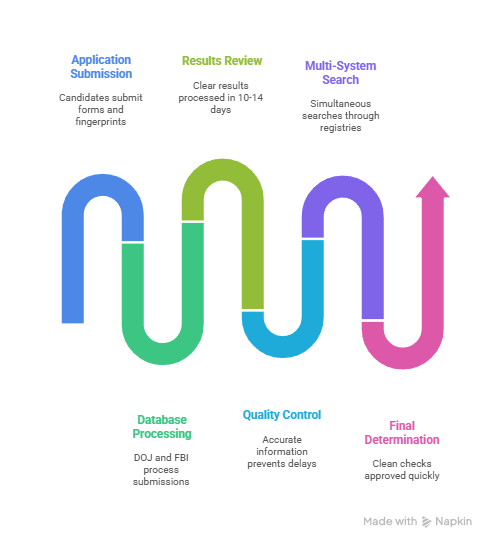
- Application Submission: Candidates complete required forms and provide fingerprints through approved channels at district offices or authorized services
- Database Processing: DOJ and FBI process submissions through state and federal databases, checking for criminal history matches
- Results Review: Clear results process within 10-14 business days, while complex cases requiring additional review take 4-6 weeks
- Quality Control: Accurate personal information and employment history prevent processing delays
- Multi-System Search: Simultaneous searches through DOJ, FBI, and sex offender registries provide comprehensive coverage
- Final Determination: Clean checks receive quick approval while cases with criminal history undergo detailed evaluation
The state prioritizes education background checks during peak hiring seasons, though increased volume can impact processing times during summer months. Cases with criminal history require additional review considering offense severity, time elapsed, and rehabilitation evidence.
Documentation and Fingerprinting Requirements
Proper documentation ensures smooth processing of education background checks. Candidates must provide valid government-issued identification and complete all required forms accurately. Incomplete or incorrect documentation frequently causes delays. This requires resubmission and extends the overall timeline.
Fingerprinting must occur through approved providers using electronic scanning technology. Most school districts maintain on-site fingerprinting capabilities or contract with authorized service providers. The quality of fingerprint images directly impacts processing speed. Poor-quality prints require resubmission and additional processing time.
Expedited Processing Options
Some circumstances may qualify for expedited processing of background checks. Emergency hiring situations or critical staffing needs may receive priority handling. Districts should contact the appropriate agencies to request expedited processing. However, these requests are not always granted and may incur additional fees.
Rush processing options are available through some private screening companies. These services can reduce processing time to 1-2 weeks in some cases. However, they typically cost more than standard processing. Districts must weigh the additional cost against the urgency of their hiring needs.Add to Conversation
Disqualifying Factors and Criminal History Considerations
California maintains specific criteria for evaluating criminal history in education background checks. Certain convictions result in automatic disqualification from school employment. Others undergo individual review processes. Understanding these standards helps employers make appropriate hiring decisions. It also ensures student safety remains the primary consideration.
Automatic disqualification applies to specific serious criminal convictions. These include violent felonies, sex crimes, drug trafficking offenses, and crimes against children. The state provides no mechanism for appeal or waiver of these disqualifications. This reflects the absolute nature of student safety priorities in educational settings.
Individual case review applies to less serious criminal convictions. Factors considered include the nature of the offense and time elapsed since conviction. Rehabilitation evidence and relevance to educational responsibilities also matter. This review process allows for case-by-case evaluation. It maintains appropriate safety standards for school environments.
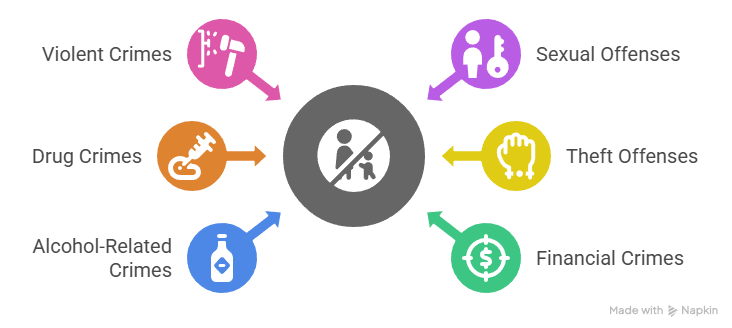
- Violent Crimes: All violent felonies result in permanent disqualification from education employment
- Sexual Offenses: Any sex crime conviction, regardless of severity, prohibits school employment
- Drug Crimes: Serious drug trafficking convictions typically result in disqualification
- Theft Offenses: Property crimes may undergo individual review based on circumstances and timeframe
- Alcohol-Related Crimes: DUI convictions often require case-by-case evaluation depending on frequency and recency
- Financial Crimes: Embezzlement or fraud may disqualify candidates from positions involving financial responsibilities
The rehabilitation assessment process considers multiple factors when evaluating questionable criminal history. Time elapsed since conviction plays a significant role. Older offenses receive more favorable consideration. Evidence of rehabilitation can influence decision outcomes positively. This includes community service, counseling completion, or stable employment history.
Character references play an important role in the review process. Letters from employers, community leaders, or other professionals can support a candidate's case. These references should speak to the candidate's character and rehabilitation efforts. They provide insight into the person's current behavior and reliability.
The nature of the offense matters significantly in the review process. Crimes directly related to child safety receive the most serious consideration. Financial crimes may be more relevant for positions involving money handling. Districts evaluate each case based on the specific requirements and risks of the position.
Appeal and Review Processes
Candidates receiving adverse background check results may pursue formal appeal processes. The California Department of Justice provides mechanisms for challenging inaccurate criminal history information. These appeals require substantial documentation and can extend the hiring timeline significantly. They remain under review throughout the appeal process.
School districts maintain internal review procedures for borderline cases. These processes typically involve human resources personnel, legal counsel, and administrative leadership. They work together in making final employment decisions. Districts must balance legal compliance requirements with staffing needs. Student safety remains the priority above all other considerations.
Conditional Employment Options
Some districts offer conditional employment pending background check completion. This allows new hires to begin work before final clearance. However, employment remains contingent on satisfactory background check results. Any disqualifying information discovered later results in immediate termination.
Conditional employment typically includes restrictions on unsupervised student contact. New employees may work only under direct supervision until clearance is complete. This protects students while allowing districts to address urgent staffing needs. Not all positions are eligible for conditional employment arrangements.
Special Considerations for Different Education Roles
Different positions within California schools have varying background check requirements and considerations. Teaching positions, administrative roles, and support staff each face unique screening standards. Understanding these differences helps ensure appropriate screening for each role while helping candidates know what to expect.
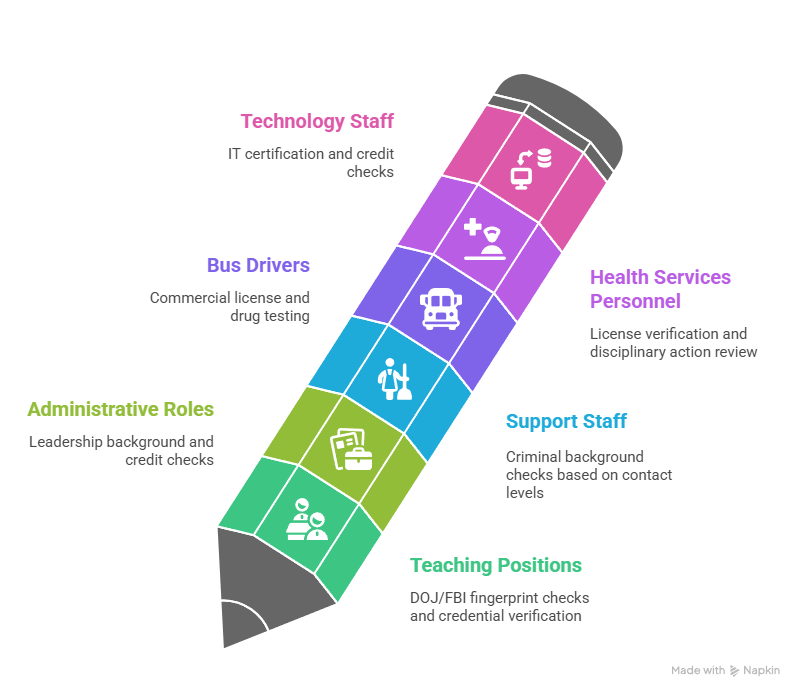
- Teaching Positions: Require comprehensive DOJ/FBI fingerprint checks, current teaching credentials, educational verification, and professional references from educational settings
- Administrative Roles: Need enhanced screening including leadership background verification, potential credit checks for financial positions, and extensive character assessments
- Support Staff: Screening varies by job duties and student contact levels, with food service, custodial, and transportation employees requiring criminal background checks
- Bus Drivers: Must complete commercial driver's license verification, driving record checks, mandatory drug/alcohol testing, and possible physical fitness assessments
- Health Services Personnel: Require professional license verification for nursing positions and review of any disciplinary actions against licenses
- Technology Staff: Face enhanced screening due to student data access, including IT certification verification and potential credit checks
The screening complexity increases with the level of student interaction and access to sensitive information. Positions involving financial responsibilities or vulnerable student populations typically require the most extensive background investigations.
Specialized Positions and Unique Requirements
Counselors and social workers face specialized screening requirements. Professional license verification is mandatory for these positions. Background checks may include review of any ethical violations or disciplinary actions. The screening process considers the sensitive nature of counseling relationships with students.
Special education staff often face enhanced background screening. Their work with vulnerable student populations requires additional scrutiny. Professional training verification is critical for these positions. Some districts require specialized reference checks from special education supervisors or colleagues.
Athletic Coaches and Extracurricular Staff
Coaching positions and extracurricular activity supervisors require full background screening. These positions often involve extended time with students and travel opportunities. Background checks for coaches may include specific searches for athletic-related violations. Some districts require coaching certification verification as part of the screening process.
Volunteer coaches face the same screening requirements as paid staff. This includes fingerprint-based background checks and professional references. The screening timeline for volunteer positions should be planned well in advance of sports seasons. Districts cannot allow unscreened volunteers to work with student athletes.Add to Conversation
Costs, Payment Responsibilities, and Budget Considerations
California education background check costs vary by screening components and service providers. Standard DOJ and FBI fingerprint processing fees total approximately $75-$100 per candidate. Total screening costs can reach $150-$200 for comprehensive packages.
Most school districts absorb background check costs as part of their hiring processes. This reflects competitive hiring markets and recognition that screening represents sound investment. Some districts may require candidates to pay initial fees with reimbursement upon employment.
Budget planning requires consideration of annual hiring volumes and screening complexity. Large districts may negotiate volume discounts with service providers. Rural districts often rely on county office services for economies of scale.
Cost-Effective Screening Strategies
Strategic planning can help districts manage background check expenses effectively. Bulk processing during peak hiring seasons often reduces per-unit costs. Establishing relationships with reliable screening providers yields benefits over time. Long-term contracts may include volume discounts and service guarantees. Districts should evaluate multiple providers to find the best value.
Technology integration offers additional cost management opportunities. Electronic fingerprinting and digital document management reduce administrative overhead. These systems improve processing efficiency and reduce errors. Initial technology investments typically pay for themselves within 2-3 years. The long-term savings can be substantial for large districts.
Grant Funding and Cost Assistance
Some federal and state grants may help offset background check costs. Title II funds can sometimes be used for personnel screening expenses. Districts should consult with grant administrators about eligible uses of funds. Proper documentation is essential for using grant funds for screening purposes. Some regional consortiums offer shared funding for background check programs.
Cost-sharing arrangements between districts can reduce individual expenses. County offices of education sometimes coordinate regional screening programs. These arrangements provide economies of scale for smaller districts. Shared services agreements can include background screening as a component. Districts should explore these options to reduce costs while maintaining quality.
Record-Keeping, Confidentiality, and Ongoing Compliance
California education background check compliance extends beyond initial screening requirements. Schools must maintain detailed records while ensuring confidentiality protections. These obligations continue throughout employment and require ongoing attention to legal developments.
Record retention requirements mandate specific documentation storage periods. Background check records must be maintained for employment duration plus additional periods specified by regulation. Secure storage protocols protect sensitive information while ensuring audit availability.
Confidentiality obligations restrict access to background check information to authorized personnel only. Unauthorized disclosure can result in legal liability for individuals and districts. The Fair Credit Reporting Act imposes additional compliance requirements on education employers.
Digital Record Management Systems
Modern record management systems offer improved security and efficiency for background check documentation. Electronic systems provide better organization and retrieval capabilities. They also offer improved security controls compared to paper-based systems. Backup and disaster recovery capabilities protect against data loss. Cloud-based systems may offer additional security and accessibility benefits.
Integration with human resources information systems streamlines record management. Automated workflows can improve efficiency and reduce errors. Electronic signature capabilities speed up processing times. Document scanning converts paper records to digital format for better management. These systems often provide better audit trails and compliance documentation.
Privacy Protection and Data Handling
Privacy protection requirements extend beyond simple confidentiality measures. Districts must implement comprehensive data protection policies. Employee training ensures proper handling of sensitive information. Regular security assessments help identify and address vulnerabilities. Incident response procedures address potential data breaches or privacy violations.
Data retention policies must balance legal requirements with privacy protection. Records should be destroyed according to established schedules when retention periods expire. Secure destruction methods prevent unauthorized reconstruction of sensitive data. Documentation of destruction activities provides compliance evidence. Regular purging of outdated records reduces security risks and storage costs.Add to Conversation
Common Challenges and Best Practices
California education background screening presents numerous challenges for school districts and candidates. Processing delays can impact hiring timelines and staffing plans, while incomplete applications require additional administrative resources. Understanding these challenges helps districts develop effective strategies and helps candidates prepare for the screening process.
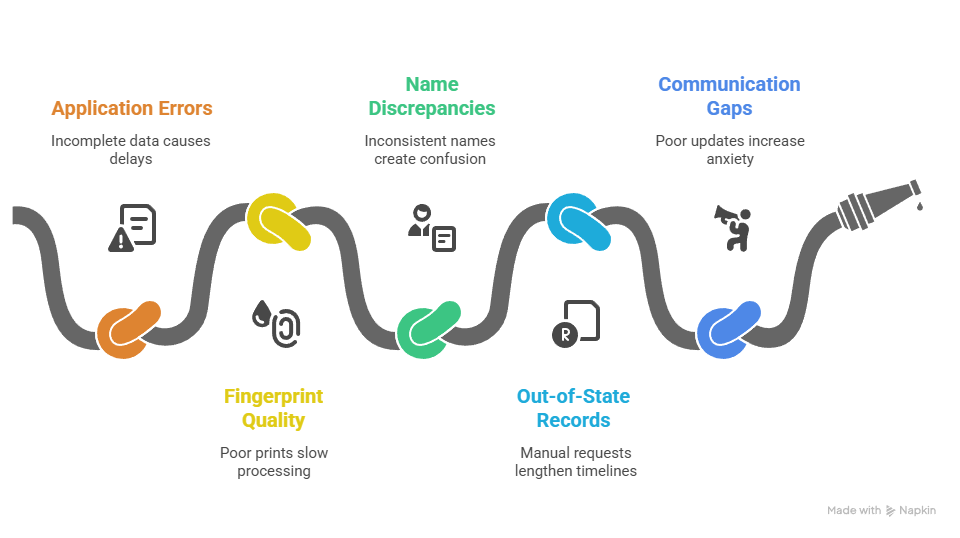
- Application Errors: Incomplete forms, incorrect information, and missing signatures cause delays
- Fingerprint Quality Issues: Poor prints require resubmission and extended processing time
- Name Discrepancies: Inconsistent names between documents create confusion and delays
- Out-of-State Records: Limited electronic sharing requires manual requests and longer timelines
- Communication Gaps: Poor candidate updates increase anxiety and confusion
- Volume Management: Peak hiring seasons overwhelm processing capabilities
Best practices include standardized procedures and consistent application of screening requirements. Written policies ensure uniform treatment while regular staff training maintains consistency. Documentation of all decisions provides legal protection and creates audit trails for compliance purposes.
Managing High-Volume Screening Periods
Peak hiring seasons create unique challenges for education background screening. Summer months typically see the highest volume of applications and screenings. Planning and preparation help manage these busy periods effectively while preventing last-minute processing rushes.
Technology solutions can help manage high-volume screening more effectively. Automated systems reduce manual processing requirements while electronic tracking systems provide better visibility. Integration with applicant tracking systems streamlines the entire hiring process and improves efficiency.
Addressing Screening Delays and Issues
Proactive communication helps address screening delays before they become critical issues. Regular monitoring of processing timelines identifies potential problems early. Escalation procedures ensure prompt resolution of complex cases while alternative providers offer backup options.
Temporary staffing solutions may be necessary when screening delays affect operations. However, these solutions also require proper screening and may not be suitable for all positions. Early planning with staffing agencies helps ensure availability when needed.Add to Conversation
Conclusion
California education background checks represent comprehensive screening systems designed to protect students through rigorous evaluation of school personnel. The process requires careful navigation of legal requirements, timeline management, and cost considerations while maintaining focus on student safety priorities. Employers must balance thorough screening with efficient hiring processes to ensure adequate staffing for educational programs. Understanding these requirements and implementing appropriate procedures enables schools to create safe learning environments while complying with all applicable legal obligations. Success depends on proper planning, clear procedures, and commitment to ongoing compliance with evolving regulations.
Frequently Asked Questions
How long do California education background checks take to complete?
Most California education background checks require 2-4 weeks for completion, though complex cases involving additional review may take 4-6 weeks or longer. Clear results typically process within 10-14 business days during normal processing periods.
What criminal convictions disqualify someone from working in California schools?
Violent felonies, sexual offenses, serious drug trafficking crimes, and offenses against children result in automatic disqualification. Less serious convictions undergo individual case review considering factors like time elapsed and evidence of rehabilitation.
Do substitute teachers need background checks in California?
Yes, substitute teachers must complete the same comprehensive background check requirements as full-time education staff, including DOJ and FBI fingerprint-based criminal history checks before beginning work in any California school district.
Who pays for education background checks in California?
Most California school districts pay for background check costs as part of their hiring processes, though some may require initial candidate payment with reimbursement upon employment. Costs typically range from $75-$100 for standard screenings.
How often must education background checks be renewed in California?
Background checks remain valid within the same school district but must be renewed when changing employers. Some districts may require periodic updates for long-term employees, typically every 3-5 years depending on local policy.
What happens if there are errors on my education background check?
Candidates can appeal inaccurate background check information through the California Department of Justice's formal challenge process. This requires substantial documentation and can extend hiring timelines while under review, but ensures accurate information for employment decisions.
Additional Resources
- California Department of Justice - Background Check Information
https://oag.ca.gov/fingerprints - California Commission on Teacher Credentialing - Educator Background Checks
https://www.ctc.ca.gov/educator-discipline/background-checks - California Education Code Section 45125 - Employee Screening Requirements
https://leginfo.legislature.ca.gov/faces/codes_displaySection.xhtml?sectionNum=45125&lawCode=EDC - Federal Trade Commission - Fair Credit Reporting Act Guidance
https://www.ftc.gov/enforcement/rules/rulemaking-regulatory-reform-proceedings/fair-credit-reporting-act - Every Student Succeeds Act - Background Check Requirements
https://www.ed.gov/essa/background-checks - National Association of Professional Background Screeners - Best Practices
https://www.napbs.com/resources/background-screening-best-practices - California School Boards Association - Employment Screening Guidelines
https://www.csba.org/GovernanceAndPolicyResources/EmploymentScreening

GCheck Editorial Team
Meet the GCheck Editorial Team, your trusted source for insightful and up-to-date information in the world of employment background checks. Committed to delivering the latest trends, best practices, and industry insights, our team is dedicated to keeping you informed.
With a passion for ensuring accuracy, compliance, and efficiency in background screening, we are your go-to experts in the field. Stay tuned for our comprehensive articles, guides, and analysis, designed to empower businesses and individuals with the knowledge they need to make informed decisions.
At GCheck, we're here to guide you through the complexities of background checks, every step of the way.





